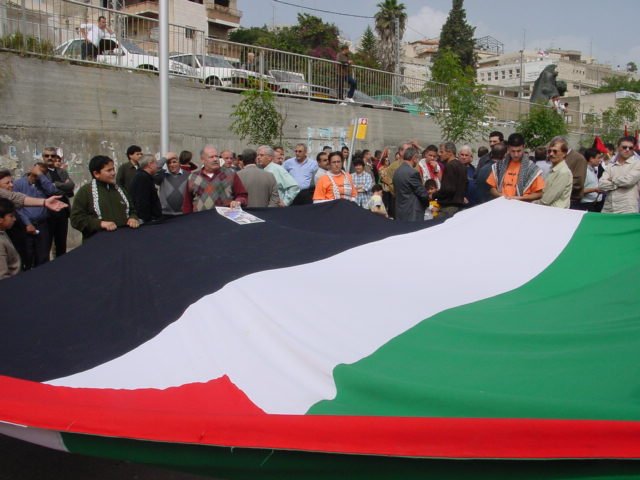April 5, 2002
A massive Palestinian flag is part of an Arab-Israeli demonstration in solidarity with the West Bank.
Today after prayers there were demonstrations by Arab-Israelis in solidarity with the Palestinians in the West Bank. Folks were a bit nervous about what response they might meet from the police, as they remembered a year and a half ago, when thirteen protesters and on-lookers were killed by police in what is here called Black October. The Orr Commission was established to "look into" police conduct and find the perpetrators of these deaths - to no great surprise, but to great anger, the commission has still failed to resolve the murders. Today, fortunately, demonstrations were peaceful and the police stayed away. We came across a smaller demonstration in Jaffa-Nazareth by the Islamic Party, also peaceful and without police.
Despite the Israeli rhetoric crying, "we are at war", the situation here is, to us, unbelievably normal. There is no comparison. No doubt that suicide bombers have done their damage not only in terms of non-combatant casualties, but also in terms of fear. But at the very least, Israelis have electricity, water, telephone service, food, etc. People may stay away from cafes and malls, but most still can go to their jobs, schools, places of worship.
Friends in Nablus are getting by with next to nothing. The Israeli forces tried to enter the Old City, but couldn't because the ancient streets are too narrow for tanks. Instead, they delivered an onslaught of rockets. "It's hell. It's really hell," said our friend, a Dutch nurse who decided to stay rather than escape.
The television continues to show the Israeli attacks on journalists. Nablus does not have many journalists in the city, and Jenin has even fewer - if any. A friend from the Arab-American University of Jenin tried to return across the Green Line back to Zababdeh. The soldiers wouldn't let her cross. She tried going through the fields, but the tanks and Apaches were on the move. She retreated to Nazareth, hoping to try again tomorrow.
Apparently the Israeli army passed through Zababdeh yesterday on their way to Tubas, though we haven't heard any news directly - now contact with Tubas is lost, too. A friend in Jenin spoke with distress about the situation there. No electricity, constant shooting nearby. He is worried about the dozens of people in Jenin who are on dialysis but cannot get to the hospitals - even if they could, they have no electricity. He still wishes safety for all, Israeli soldiers included. He related a story from the first Intifada when he was a student at Birzeit University. He came across a wounded Israeli soldier, whom he drove to Hadassah Hospital - such is his understanding of Christian faith. The irony is that, while he is living in the midst of news, batteries on his radio will not last much longer, and he will have no idea what is happening around him.
Hope flickers as Zinni meets with Arafat and as Powell plans his trip here. But it all feels like too little too late - so much blood has been shed, so many people have died, and are dying now. We spent a good part of the day on the telephone with our elected officials in DC. It feels so necessary, but like just a drop in the bucket.

